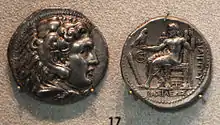Philip III of Macedon
Philip III Arrhidaeus (Ancient Greek: Φίλιππος Γ΄ ὁ Ἀρριδαῖος; c. 359 BC – 25 December, 317 BC) reigned as king of Macedonia from after 11 June 323 BC until his death. He was a son of King Philip II of Macedon by Philinna of Larissa, and thus an elder half-brother of Alexander the Great. Named Arrhidaeus at birth, he assumed the name Philip when he ascended to the throne.
| Philip III of Macedon | ||||||||||||||||||||||||||||||||||||||||||||||||||||||||||||||||||||||||||||||||
|---|---|---|---|---|---|---|---|---|---|---|---|---|---|---|---|---|---|---|---|---|---|---|---|---|---|---|---|---|---|---|---|---|---|---|---|---|---|---|---|---|---|---|---|---|---|---|---|---|---|---|---|---|---|---|---|---|---|---|---|---|---|---|---|---|---|---|---|---|---|---|---|---|---|---|---|---|---|---|---|---|
 Tetradrachm of Philip III Arrhidaeus | ||||||||||||||||||||||||||||||||||||||||||||||||||||||||||||||||||||||||||||||||
| King of Macedonia | ||||||||||||||||||||||||||||||||||||||||||||||||||||||||||||||||||||||||||||||||
| Reign | traditional: 323–317 BC | |||||||||||||||||||||||||||||||||||||||||||||||||||||||||||||||||||||||||||||||
| Predecessor | Alexander III | |||||||||||||||||||||||||||||||||||||||||||||||||||||||||||||||||||||||||||||||
| Successor | Alexander IV | |||||||||||||||||||||||||||||||||||||||||||||||||||||||||||||||||||||||||||||||
| Pharaoh of Egypt | ||||||||||||||||||||||||||||||||||||||||||||||||||||||||||||||||||||||||||||||||
| Reign | traditional: 323–317 BC | |||||||||||||||||||||||||||||||||||||||||||||||||||||||||||||||||||||||||||||||
| Predecessor | Alexander III | |||||||||||||||||||||||||||||||||||||||||||||||||||||||||||||||||||||||||||||||
| Successor | Alexander IV
| |||||||||||||||||||||||||||||||||||||||||||||||||||||||||||||||||||||||||||||||
| Spouse | Eurydice | |||||||||||||||||||||||||||||||||||||||||||||||||||||||||||||||||||||||||||||||
| Dynasty | Argead dynasty | |||||||||||||||||||||||||||||||||||||||||||||||||||||||||||||||||||||||||||||||
| Father | Philip II | |||||||||||||||||||||||||||||||||||||||||||||||||||||||||||||||||||||||||||||||
| Mother | Philinna of Larissa | |||||||||||||||||||||||||||||||||||||||||||||||||||||||||||||||||||||||||||||||
| Religion | Ancient Greek religion | |||||||||||||||||||||||||||||||||||||||||||||||||||||||||||||||||||||||||||||||
As Arrhidaeus grew older it became apparent that he had mild learning difficulties. Plutarch was of the view that he became disabled by means of an attempt on his life by Philip II's wife, Queen Olympias, who wanted to eliminate a possible rival to her son, Alexander, through the employment of pharmaka (drugs/spells); however, most modern authorities doubt the truth of this claim.[1]
Alexander was fond of Arrhidaeus and took him on his campaigns, both to protect his life and to prevent his use as a pawn in any prospective challenge for the throne. After Alexander's death in Babylon in 323 BC, the Macedonian army in Asia proclaimed Arrhidaeus as king;[2] however, he served merely as a figurehead and as the pawn of a series of powerful generals.
Biography
_-_(Close-up_of_a_Sculpture_(Profile_of_a_Head)%252C_Karnak)_-_Google_Art_Project.jpg.webp)
Even though Arrhidaeus and Alexander were about the same age, Arrhidaeus appears never to have been a danger as an alternative choice for Alexander's succession to Philip II; nevertheless, when the Persian satrap of Caria, Pixodarus, proposed his daughter in marriage to Philip, the king declined, offering his son Arrhidaeus as husband instead, and Alexander thought it prudent to block the dynastic union (which might have produced a possible future heir to Philip's domain before Alexander himself did), resulting in considerable irritation on the part of his father (337 BC).[3] Arrhidaeus' whereabouts during the reign of his brother Alexander are unclear from the extant sources; what is certain is that no civil or military command was given to him in those thirteen years (336–323 BC).
He was in Babylon at the time of Alexander's death on 10 June 323 BC. A succession crisis ensued. Arrhidaeus was the most obvious candidate, but he was mentally disabled and thus unfit to rule.[4] A conflict then arose between Perdiccas, leader of the cavalry, and Meleager, who commanded the phalanx: the first wanted to wait to see if Roxana, Alexander's pregnant wife, would deliver a male baby, while the second objected that Arrhidaeus was the closest living relative and so should be chosen king. Meleager was killed, and a compromise was engineered: Arrhidaeus would become king, with the name of Philip, and he would be joined by Roxana's yet-unborn child as co-sovereign should that child prove a male. This eventuality did indeed arise and resulted in Roxana's son, Alexander, becoming with his uncle Phillip III co-sovereign on the throne of Macedon. It was immediately decided that Philip Arrhidaeus would reign, but not rule: this was to be the prerogative of the new regent, Perdiccas.
When news arrived in Macedonia that Arrhidaeus had been chosen as king, Cynane, a daughter of Philip II, developed a plan to travel to Asia and offer the new king her daughter Eurydice for wife. This move was an obvious affront to the regent, whom Cynane had completely bypassed, and to prevent the marriage, Perdiccas sent his brother, Alcetas, to kill Cynane. The reaction among the troops generated by this murder was such that the regent had to give up his opposition to the proposed match and accept the marriage. From that moment on, Philip Arrhidaeus was to be under the sway of his bride, a proud and determined woman bent on substantiating her husband's power.

Eurydice's chance to increase her husband's power came when the first war of the Diadochi sealed the fate of Perdiccas, making a new settlement necessary. An agreement was made at Triparadisus in Syria in 321 BC. Eurydice moved deftly enough to achieve the removal of the first two designated regents, Peithon and Arrhidaeus (a namesake of her husband), but was powerless to block the aspirations of Antipater, whose position proved too powerful, and the latter was made the new regent; Philip Arrhidaeus and Eurydice were forced to follow Antipater back to Macedonia.
The regent died of natural causes the following year, nominating as his successor not his son Cassander, but his friend and lieutenant, Polyperchon. Cassander's refusal to accept his father's decision sparked the Second War of the Diadochi, in which Eurydice saw once again a chance to free Philip from the control of the regent.
An opportunity presented itself in 317 BC when Cassander expelled Polyperchon from Macedonia. Eurydice immediately allied herself with Cassander and persuaded her husband to nominate him as the new regent. Cassander reciprocated by leaving her in full control of the country when he left to campaign in Greece.
But individual circumstances and events at this time were subject to rapid change. That same year, Polyperchon and Olympias allied with her cousin, Aeacides, king of Epirus, and invaded Macedonia. The Macedonian troops refused to fight Olympias, the mother of Alexander. Philip and Eurydice had no choice but to escape, only to be captured at Amphipolis and thrown into prison. It soon became clear that Philip was too dangerous to be left alive, as Olympias' many enemies saw him as a useful tool against her, and so on 25 December 317 BC, she had him executed, while his wife was forced to commit suicide.
Tomb

In 1977, important excavations were made near Vergina leading to the discovery of a two-chambered royal tomb, with an almost perfectly preserved male skeleton. Manolis Andronikos, the chief archaeologist at the site, along with a number of other archaeologists, decided it was the skeleton of Philip II, but others have disputed this attribution and instead proposed it to be the remains of Philip Arrhidaeus.
Arrhidaeus in fiction
He appears as one of the main characters in the novel Funeral Games by Mary Renault. In Renault's version, the villainous Cassander slows down his advance on Macedonia to give Olympias enough time to kill Arrhidaeus and Eurydice.
Arrhidaeus is also a main character in Annabel Lyon's novel The Golden Mean. In it, the young Arrhidaeus is tutored by Aristotle while he also mentors his younger half-brother, the future Alexander the Great. Alexander, who is initially disgusted with his brother's inferior intellect, learns to love him before he sets out to conquer the world.
In the Japanese fiction manga Historie, he was shown as an intellectually disabled young child, who became happy when Eumenes made him a toy chariot and became sad when Alexander the Great destroyed his toy. Eumenes later replaced it with a new one, telling him to bury the chariot.
Arrhideaus is also portrayed in the Indian historical drama series Porus.
Phillip is a prominent character in the Eric Flint novel The Alexander Inheritance and its sequel The Macedonian Hazard. Phillip is portrayed as having an affectionate relationship with Eurydice that is marred by his inability to stand being touched. The appearance of a cruise ship of time travelers a few months after Alexander's death changes history, and prevents Phillip and Eurydice's deaths, although they spend a time as prisoners of Antigonus I Monophthalamus. He is portrayed as having a spectrum disorder, but a photographic memory and a talent for mental arithmetic. His condition improves after sessions from a therapist among the time travelers, along with medical marijuana and other drugs, and fathers a child with Eurydice in the second book.
References
- Habicht, Christian (1998). Ελληνιστική Αθήνα [Hellenistic Athens] (in Greek). Athens: Odysseas. ISBN 960-210-310-8.
- Smith, William (editor); Dictionary of Greek and Roman Biography and Mythology, "Arrhidaeus (1)", "Eurydice (3)", Boston, (1867)
- Elizabeth Donnelly Carney (2006). Olympias: mother of Alexander the Great. Taylor & Francis. pp. 24–25. ISBN 978-0-415-33316-0. Retrieved 14 June 2011.
- Siculus, Diodorus. Bibliotheca Historica, 18.2.1-4.
- Plutarch. Alex.. 10.2-3.
- Habicht 1998, p. 69.
- Stella Drougou, Chrysoula Saatsoglou-Paliadeli. Verghina, Hellenic Minister of Culture, Athens, 2005 (p. 45, p. 59) ISBN 960-214-385-1
External links
| Wikimedia Commons has media related to Philip III of Macedon. |
- Wiki Classical Dictionary: Arrhidaeus
- Page about coinage during his reign
- An archaeological report about his grave and remains
- A National Geographic article about the group of tombs, one of which is now said to be his (April 2008)
Philip III of Macedon Born: 359 BC Died: 317 BC | ||
| Regnal titles | ||
|---|---|---|
| Preceded by Alexander the Great |
King of Macedon King of Asia Pharaoh of Egypt 323 BC – 317 BC |
Succeeded by Alexander IV |

